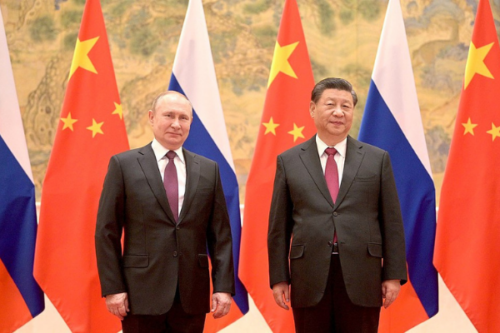Q+A
Tony Saich on Sino-Russian relations and how Beijing views the invasion of Ukraine
Saich, an expert on the political economy of China, sat down with the Ash Center to explore the evolution of China and Russia’s relationship and how now, Beijing views the unfolding events in Ukraine.

Most world powers refused to send high-level diplomatic delegations to the 2022 Beijing Winter Games—except for Russia. The Olympics served as a stage for China’s Xi Jinping and Russian President Vladimir Putin to flout their growing partnership, with the two leaders holding a summit before the opening ceremonies calling for a halt to further NATO expansion. Many analysts wondered if the warming relations was a tacit signal of support from Beijing for Putin’s invasion of Ukraine, which unfolded only days after the Olympics concluded.
To discuss the evolution of Russian-Chinese relations in the Putin and Xi era as well as how the military assault is being viewed in Beijing, we sat down with Tony Saich, Daewoo Professor of International Affairs at Harvard Kennedy School and an expert on China’s politics and state institutions.
Ash: Was China taken aback by the full scope of the Russian invasion of Ukraine, which seems clearly bent on toppling the democratically-elected Zelensky government in Kyiv? Or does it seem that Xi tacitly signed off on Putin’s plans?
Saich: While there is no clear evidence that Putin informed Xi of the totality of his plans—indeed some signs suggest that Beijing was caught off guard—there will always remain a suspicion that Xi knew more than has been revealed. Certainly, Xi would have wanted a guarantee that there would be no increased dramatic actions before the closing ceremony of the Winter Olympics. The February “Joint Statement,” which some view as a manifesto for a New World Order, is essentially a list of China’s priorities, naming Taiwan specifically. A couple of bones are thrown to Russia, such as recognizing its legitimate security concerns, but without the meat of an explicit mention of Ukraine. The absence of any explicit mention of Ukraine, suggests caution on Beijing’s part.
Ash: Is Xi likely to provide significant diplomatic cover for Putin’s plans?
Saich: China’s desire not to be drawn directly into support of an invasion is shown by its initial response and Xi‘s and Putin’s phone call on February 25. Xi’s comments show continued support for Putin while trying to position China as a rational voice for calm. China repeated its call for negotiation to be the main driving force for resolving the conflict and reasserted its basic position on the sovereignty and territorial integrity of all nations. The Chinese authorities have taken on board Russia’s talking points and have accused the US of having stoked the conflict through its rhetoric, the sale of weapons, and the pressure it has applied on what Russia sees as its security space. Putin is obsessed with history and what he sees as the loss of Russia’s dignity after the fall of the Soviet Union. China has supported his view that the core of the problem is the subsequent expansion of NATO into what was traditional Soviet domains, and supports Putin’s view that the independence of Ukraine has been exploited by NATO members to threaten Russia’s security.

Ash: How has the Chinese reaction to the ongoing Ukraine invasion differed from the 2014 Crimea annexation?
Saich: The main difference now is the evolution of the relationship since 2014, which has become closer in economic terms and in both nations’ opposition to the West. The sanctions imposed following the annexation of Crimea pushed Russia to deal more with China and China was a willing partner, buying oil and increasing investments in Russian companies. While the “Joint Statement” is certainly a dramatic step forward in the relationship and both see it as a “redistribution of power in the world,” they are clear not to declare an alliance and that it should not be seen as confrontational and not directed at any third party. While it may be true that it is not an alliance, you can take with a pinch of salt the idea that it is not targeted at any third party. The ongoing conflict in Ukraine will reveal whether there is a deeper bond or whether the relationship is essentially transactional. As is usual in contentious issues at the UN, China has abstained in votes to criticize Russia. Thus, not too much should be read into this abstention. There are three possible actions we might look for that would indicate “China has thrown its lot in with Russia.” These include Beijing using a veto, rather than an abstention, of any U.N. resolution to criticize Russia’s actions; recognition of a puppet regime in Ukraine put in place by Russia; and a refusal to call the attack an invasion even after civilian deaths are clearly confirmed.
Ash: Is Beijing watching how the world responds to Russia’s invasion of Ukraine with an eye toward Taiwan? And if so, how might they interpret the actions of the U.S. and the G7 thus far?
Saich: Of course, but as far as Beijing is concerned they are two completely different matters, as they view Taiwan already as an inalienable part of China. That said, they will be interested to see how the West responds with an eye to future developments related to Taiwan. It was important for China to include specific reference to Taiwan in the “Joint Statement” but senior leaders have been cautious about drawing any linkage. Some of the more strident press in China has, however, drawn the link. One source noted that the U.S. would not have the capability to wage a military campaign in the Taiwan Straits because it was entrapped in Ukraine. Online nationalists have also praised Putin for this actions, suggesting that China should use his example to invade Taiwan. Those in China who have criticized support for Russian actions as not being in China’s own interests have been criticized as traitors. A joint letter authored by five professors opposing Russia’s move against Ukraine was posted on WeChat and subsequently taken down but not before it was up long enough to be circulated. These internal differences show that the Beijing leadership also has a fine line to walk domestically.
How Beijing responds will reveal just how transactional the revived relationship between China and Russia is.
Ash: What are the pitfalls for Putin and Russia to tightening their embrace of Beijing? What political risks does Beijing face in potentially closely embracing a revanchist Russia?
Saich: The “Joint Statement” clearly reveals that China is the dominant partner in the relationship, something that might irk Putin. With more sanctions looming from the West, he will have no choice other than to rely increasingly on China for economic and diplomatic support. However, China will pursue its national interest above all else and this may, or may not coincide with Russia’s interests. For China, the actions raise three challenges. First, it may challenge the oft-cited principle that China does not support the interference of outsiders in the internal affairs of another nation. Second, before the invasion, China has maintained the primacy of Ukraine’s territorial sovereignty. Third, how events unfold over the next few weeks and months will create an uncertain international environment in a year when Xi wants stability above all else, so that his “coronation” at the Twentieth Party Congress (late-2022) is not disturbed. China has dealt with the first two issues by following Russia’s talking points on western expansion and aggression and Russia’s legitimate right to protect its security space. The third will be more difficult to deal with as China’s economy and companies will get caught in the economic fall-out. In addition, depending on how closely China follows Russia will dictate the extent to which it will be viewed more critically by western nations, at a time, when Xi would prefer calmer relations.
Thus, how Beijing responds will reveal just how transactional the revived relationship between China and Russia is, and whether China is willing to damage further its international reputation by throwing itself behind Russia in the face of Western hostility. It is trying to walk a difficult middle line.